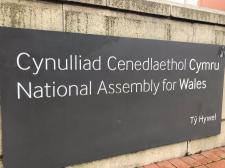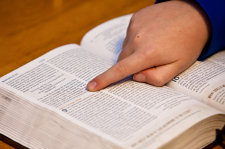
21st Century RE for All
We want every pupil to have the same entitlement to high quality, non-partisan education about religion and belief. We want to see all schools preparing young people for life in modern Britain by teaching pupils about the diversity of religious and non-religious worldviews.
We're campaigning for an end to the arbitrariness and unfairness of local determination in Religious Education and for a national religion and belief education syllabus as part of the National Curriculum.
What’s the problem?
Religious education is out of date and in need of reform. Almost thirty years after the introduction of a national curricular entitlement for all pupils, one subject remains exempt – religious education. Unlike any other compulsory subject RE is determined at a local level.
In each local authority the local agreed syllabus for religious education (RE) is determined by 'Standing Advisory Councils on Religious Education' (SACREs), largely made up of religious representatives, with non-religious representatives either excluded or barred from voting.
Even worse, many faith schools don't even need to follow the locally agreed syllabus, and can instead teach their own syllabus and teach religion from their own exclusive viewpoint.
If there is a body of knowledge called 'Religious Education', which is worthy of being taught at all, it should be offered to all children wherever they live. There are simply no grounds for discriminating on grounds of geographic location or school type. If a programme of study covering religion and belief deserves to be included in the school curriculum, it should be offered to all as a basic entitlement for every future citizen. This is simply a matter of fundamental justice and equality.
Importantly, the subject must be broad, balanced and inclusive. Religious interest groups should no longer determine what gets taught. As with other subjects, the syllabus should be nationally determined by independent educationalists without an agenda motivated by a specific religion or belief.
"The structures that underpin the local determination of the RE curriculum have failed to keep pace with changes in the wider educational world. As a result, many local authorities are struggling to fulfil their responsibility to promote high-quality religious education"
OFSTED report 'Religious Education: Realising the Potential'
Get involved
With the General Election coming up, as a nation we're thinking about our future. Please consider asking your candidate to support common sense secular reforms — such as reforming religion and belief education — that will make our society, education system, and laws fairer for all.
It’s time to take religious education in schools out of the hands of religious councils. Support a national entitlement to high quality, non-partisan education about religion and belief.
Sign the petition-
A selection of comments from the petition. Supporters on what this campaign means to them and the need to reform religion and belief education.
Find out more
NSS submission to the Commission on Religious Education
We’ve called on the Commission to support pupils’ basic entitlement to non-partisan education about religion and belief, and an end to RE controlled by religious groups or faith schools.
Religious Education and the law
RE is a statutory part of the basic curriculum in all schools, but is often shaped by local religious groups and faith schools.
Your rights: Withdrawal from RE and Collective Worship
We advocate comprehensive non-partisan reform of religion and belief education and an end to compulsory worship in schools, so no one has to withdraw from any part of the school day.
Why Religious Education must be reformed before ending parental opt-out
The right to withdraw from RE may sometimes be problematic, but is still necessary when until vestiges of confessionalism, proselytization and poor practice remain.
Standing Advisory Councils on Religious Education
Dominated by religious representatives, SACREs determine the RE syllabus at a local level.
Related news and opinion
Welsh faith schools will have to offer reformed syllabus on religion
Posted: Tue, 5 May 2020 16:06
Faith schools in Wales will be required to offer a non-denominational religion, values and ethics (RVE) syllabus where parents request it under proposals outlined today.
Under Welsh government plans faith schools will be allowed to continue to teach RVE from a religious perspective but will also be required to offer a more impartial alternative.
The proposals would amend ministers' plans to remove the parental right to withdraw children from religious education, which were outlined in January.
Parents will be able to opt for the non-denominational syllabus but will not be allowed to withdraw their children.
Meanwhile non-faith schools will no longer have to offer a faith-based syllabus when parents request it.
The National Secular Society has lobbied the Welsh government throughout the process of drawing up the new syllabus.
The NSS has urged ministers, including education minister Kirsty Williams, not to remove the right to withdraw from education about religion until it is suitably reformed.
Ministers considered more fundamental reform
In a consultation document outlining its plans, the Welsh government has made clear that it considered imposing a new obligation on all schools to teach RE in a pluralistic manner.
But it added that it was "not proposing to pursue this option because it would have significant implications for schools of religious character".
NSS reaction
NSS chief executive Stephen Evans said the latest plans represented a welcome acknowledgement of human rights concerns but created significant and needless complexity.
"The Welsh government has rightly recognised that removing the right of withdrawal from religious education will have human rights implications unless the subject is substantially reformed, particularly in faith schools.
"But its solution raises serious questions about the practicality of faith schools running two different syllabuses. It leaves the subject area in the hands of special interest groups and falls short of ensuring all pupils have equal access to an objective and pluralistic education about religion and belief.
"This is also a reminder that state sponsorship of faith schools obstructs efforts to introduce suitable reforms to RE and make education about religion and belief credible."
Reiteration of previous plans
The document also reiterates plans which had previously been outlined, including:
- A decision to change the name of religious education to religion, values and ethics.
- A plan to retain SACREs – bodies which determine RE syllabuses locally – but attempt to make them more inclusive by including Humanist representatives. The NSS campaigns for the abolition of SACREs so all children are entitled to an impartial religion and belief curriculum.
- A requirement that RVE syllabuses include non-religious worldviews.
The NSS is encouraging supporters in Wales to respond to the consultation, which closes on 28 July.
Parents set to lose right to withdraw children from RE in Wales
Posted: Tue, 21 Jan 2020 09:02
The Welsh government plans to remove parents' right to withdraw children from lessons on religion, relationships and sexuality and to rename religious education as 'Religion, Values and Ethics'.
In an announcement on Tuesday morning, ministers said children would have "universal access" to the "full curriculum", which is due to become active in 2022.
The Welsh government said it had chosen 'Religion, Values and Ethics' as a name to replace RE as it had proved the most popular during an eight-week consultation on the issue.
It also said the right to withdraw from relationships and sexuality education (RSE) would be removed.
In response the National Secular Society said the changes to RE "must be contingent on substantial reforms" to ensure religion is taught objectively in all schools, including faith schools.
The NSS welcomed the decision to remove the parental right to withdraw from RSE.
Education minister Kirsty Williams said: "Our responsibility as a government is to ensure that young people, through public education, have access to learning that supports them to discuss and understand their rights and the rights of others.
"It is essential that all young people are provided with access to information that keeps them safe from harm."
She added that the decision would need "careful and sensitive implementation".
NSS chief executive Stephen Evans said: "Religious education is a highly contentious area of the curriculum. Removing the parental right of withdrawal must be contingent on substantial reforms to ensure the subject area is genuinely objective, critical and pluralistic.
"Faith schools still being permitted to teach the subject in accordance with their faith ethos will fail this test, rendering the Welsh policy incompatible with the European Convention on Human Rights.
"The decision to remove the right to withdraw from relationships and sexuality education is welcome and sensible. This will safeguard children's right to access information which is crucial both to their own wellbeing and that of others."
Mr Evans is due to meet the minister next week to discuss the potential implications of the changes.
Relevant NSS campaigning
- The NSS has engaged with the Welsh government throughout the process of drawing up the new curriculum.
- In response to the recent consultation the NSS urged ministers not to remove the parental right to withdraw children from RE until the subject was fully reformed to make it objective, critical and pluralistic.
- The NSS argues that all children should be entitled to an impartial religion and belief curriculum.
New curriculum in Wales
- Last year the Welsh government's published plans for the new curriculum included an explicit reference to pupils learning about "non-religious worldviews" for the first time and moved RE into a wider area of Humanities study.
- The NSS expressed broad support for these changes but warned the curriculum would allow faith schools to continue to use RE to promote their worldview and to distort RSE.
The 1944 Education Act was a landmark law – but let’s reconsider the privileges it granted to religion
Posted: Wed, 18 Dec 2019 11:52
Three-quarters of a century ago an enduring piece of legislation secured free education for all – but gave churches substantial control over schools in return. Keith Sharpe says this settlement needs updating.
As the end of 2019 approaches, a little noticed anniversary ought to be acknowledged. It is 75 years since the 1944 Education Act cleared its second reading in the House of Commons. In its time it was an extraordinary political achievement, creating a new post-war consensual framework for a more equitable system of schooling. For the first time ever primary and secondary education would be provided to all free of charge in England and Wales.
In 1938 most children, approximately 80%, left school at 14 having only attended an all age elementary school. During the Second World War there emerged a widespread feeling that once it was over Britain should be a better place – a New Jerusalem, as a popular contemporary phrase had it. It was hoped that there would be a more closely knit society reflecting the social solidarity of wartime. The campaign for secondary education for all was a major part of this.
The key player in the development of the legislation was an ambitious young Conservative MP, Richard Austen Butler – who the prime minister, Winston Churchill, had made president of the Board of Education in 1941. During 1943 he famously spent a fateful weekend at Chequers where, after a lot of difficult debate and argument, he succeeded in persuading Churchill to support his radical proposals for a fundamental reform of schooling. In time the 1944 act came to be known as the Butler Act.
The act led to the establishment of the tripartite system of grammar schools, technical schools and secondary modern schools, although in practice very few technical schools were created. In fact therefore the system was really bipartite. At the end of primary schooling children were to be 'classified' according to school records and parental aspirations, with testing being used to 'supplement' the information about each pupil. Eventually of course the testing became more important and the phrase 'the eleven plus' entered common currency. The school leaving age was raised to 15 with a clause to raise it subsequently to 16, although this did not happen until 1973.
A major problem facing Butler at the time was persuading the churches to support his plans. They controlled a large number of schools. If they objected Butler knew that Churchill would not want any confrontation with them, and this might then put the whole project at risk. In the end Butler effectively bought them off by agreeing that the state would pay for their schools, including the cost of repairing many inadequate buildings. He also allowed them to determine the nature of their schools' daily acts of worship and their syllabuses for religious instruction, but with an opt out for any parents who might want it.
The act said nothing about the curriculum to be taught – except with regard to religious education, which was the only compulsory subject prescribed. The legislation specified that "the school day in every county school and in every voluntary school shall begin with collective worship on the part of all pupils". And then every local education authority was to be responsible for drawing up "an agreed syllabus of religious instruction", which schools in its area would be required to follow. To help it in this process legal power was given to constitute a Standing Advisory Council on Religious Education (SACRE). The SACREs later became permanent bodies with legal powers as part of the 1988 Education Reform Act.
The importance of the Butler Act is not just as a great historical landmark. Many of its provisions still shape the system of schooling in England and Wales today.
The daily collective act of worship is still a legal requirement but more than three quarters of secondary schools fail to meet it and are in effect breaking the law. The 1988 act added the proviso that such worship should be "wholly or mainly of a broadly Christian character", which does not reflect the diversity of beliefs in contemporary society.
In recent years governments have become more concerned about strengthening children's sense of national identity and feeling of 'Britishness' in the face of this multiplicity of worldviews. Butler's concern with spiritual development, then synonymous with Christianity, now should become more focused on a form of civic education such as has long been in the case in other countries like France.
The SACREs are still able to exert an important influence on religious education curricula. The Church of England has an automatic right to be represented on all of these committees despite church attendance being in freefall. Other representatives are supposed to reflect the principal religious traditions of an area. But it would be better for all children across the nation to be taught the same thing about religions and worldviews irrespective of 'local circumstances', as the NSS's '21st century RE for All' campaign advocates. Religion should be taught in an equitable way which enables children to make their own minds up about it.
The daily act of collective worship should be ended. The postcode lottery of local control of RE and the system of SACREs should be abolished. There should be a national entitlement for all pupils to high quality, non-partisan education about the diversity of religious and non-religious worldviews. Any form of confessionalism or religious instruction should be separated from the subject and only ever take place in a voluntary non-state environment.
The 1944 act was a remarkable achievement for its time. But 75 years on, its legacy continues to leave our education system mired in religious privilege. It's time for some constructive criticism.
See also: NSS to address legacy of 1944 Education Act in lecture.
Don’t remove right to withdraw from RE, NSS urges Welsh ministers
Posted: Fri, 29 Nov 2019 10:59
The National Secular Society has urged the Welsh government not to remove parents' right to withdraw children from religious education until the subject is fully reformed.
Education ministers in Wales are considering removing the right of withdrawal as part of a proposed new curriculum, which also proposes to rename RE as 'Religion and Worldviews' (RW).
In response to a consultation over the curriculum, the NSS said:
- It had "no objection in principle" to removing the right to withdraw from a fully reformed study of religion, but its support was contingent on "institutional and cultural change".
- The study of worldviews should be "genuinely objective, critical and pluralistic".
- The right to withdraw particularly helped to protect parental freedom and children's independent rights when faith schools teach RE in a way that aligns with their religious ethos.
The NSS also called for all pupils to have an entitlement to receive "a broad and balanced education about different worldviews".
The society said there were circumstances in which the right to withdraw would "undermine children's rights to access education and to gain understanding of and respect for those with different worldviews".
But it noted that religious groups' historical and continuing influence over the way religion is taught meant there would be "significant human rights implications" to removing the long standing right.
NSS head of education Alastair Lichten said: "In principle there should be no right to withdraw from any subject.
"But RE in Wales has historically been taught in a way which promotes religion. The right to withdraw has been a crucial safeguard against this for families with reasonable objections. And reforms to the subject don't go far enough to justify ending this safeguard."
The NSS also said the subject should be renamed as 'Worldviews' rather than 'Religion and Worldviews', which still treated religion as "the default" and non-religious worldviews as "an addition or afterthought".
NSS backs end to right to withdraw from RSE
Within the consultation the NSS also expressed support for plans to end the right to withdraw from a new subject of relationships and sexuality education (RSE).
And the society challenged the Welsh government's conflation of the right to withdraw from RW with the right to withdraw from RSE, arguing that the two measures had different implications.
Mr Lichten said: "Lessons about relationships and sexuality promote children's health and wellbeing and the harm caused by withdrawing children from them is potentially significant, both for themselves and for others.
"It is possible that through RSE children are exposed to information and ideas which conflict with their parents' religious convictions. However, this is balanced against the child's right and significant interest in receiving a full education."
RE Council's response
- The chief executive of the RE Council, Rudolf Elliot Lockhart, said it would be "necessary to ensure that the subject and its delivery will be objective, critical, and pluralistic in all settings" before removing the right to withdraw from RW.
- The RE Council also described the conflation of the right to withdraw from RW and the right to withdraw from RSE as "regrettable" on similar grounds to the NSS.
- The RE Council represents the views of a variety of parties with a significant interest in religious education in England and Wales.
Read more: This isn't the time to end the right to withdraw from RE in Wales, by Alastair Lichten
Image via Needpix.com.
This isn’t the time to end the right to withdraw from RE in Wales
Posted: Thu, 14 Nov 2019 15:21
The Welsh government is considering removing the parental right to withdraw from religious education. Alastair Lichten argues that despite potential benefits, reforms don't go far enough to justify ending this longstanding right.
The Welsh government is consulting on plans to remove the parental right to withdraw from Religious Education, to be renamed Religions and Worldviews. We want every pupil to have the same entitlement to high quality, non-partisan education about worldviews, something the right to withdraw can seem to undermine. Withdrawal from RE has long been a source of contention, it is something of an anomaly and can be problematic.
But there are good reasons to be sceptical of these proposals – and the National Secular Society has raised them in our response to the consultation.
1. Why now?
The Welsh government claims that reforms to the way religious and non-religious worldviews are taught in school will alleviate the need for a right to withdraw. However, removing this longstanding right without first seeing how the reforms bed in seems somewhat premature. A period of time is necessary to allow a more accurate assessment of how the subject has changed and whether the right remains necessary.
2. What about in faith schools?
Faith schools will still be permitted to teach religious education in accordance with their faith ethos. Many teachers will continue to be selected on the basis of their religious beliefs and in many faith schools the subject will continue to be inspected by religious bodies rather than Estyn, the education inspectorate for Wales. It is not enough to simply provide information about a broad range of worldviews, if a school continues to privilege a specific worldview or range of views. Denominational RE both directly and indirectly conveys a message that certain religious worldviews (or range of worldviews) are worthy of greater prominence or respect.
3. Do reforms go far enough?
Almost all European states make some provision for a right to withdraw from religious education. This is because in most countries, including Wales, the subject's roots (despite significant reforms) lie in confessionalism and faith formation.
The consultation's central argument is that a new "pluralistic requirement" negates any need to withdraw. Pluralism is a step forward, but it doesn't solve every problem. RE has evolved from a way of inculcating Christian beliefs to a way of promoting a largely positive view of the major religions – with Humanism increasingly thrown in to represent the non-religious majority.
The latest changes fundamentally don't change this advertising space mentality. What gets taught in schools will still be heavily influenced by local committees of religious groups, whose raison d'être is their own representation in a positive light – something that is widely regarded as educationally inappropriate. Most RE teachers also view it as their job to promote a positive view of religion and frame negative manifestations as "false" or "distorted" to "counteract prejudices".
While the proposed new subject name of 'religion and worldviews' may be a step towards parity of esteem for non-religious ways of making sense of the world, it still frames them as an afterthought. Calling the subject simply "Worldviews" would convey a fresh start and move away from religious exceptionalism. After all, we wouldn't have a subject called "running and sport" or "drawing and art".
4. What about parents' rights?
Parents' rights are not absolute. They shouldn't get to pick and mix the parts of the curriculum they want their children to learn or be able to shield their children from objective knowledge about worldviews they don't share. But respecting parents' rights to raise their children in accordance with their beliefs (and children's independent rights as they mature) means they shouldn't be forced to accept RE where it retains elements of confessionalism and bias.
The consultation acknowledges that these rights are potentially breached "if a school fails to provide pluralistic education in these subject areas" and that "there is some risk that they may in practice be delivered in a way which in some respects does not meet that requirement".
In the many cases where we have acted to assist parents in exercising their right to withdraw from RE in England and Wales, there are no examples where parents have been opposed to their children receiving broad and balanced information about other people's beliefs. Where parents have concerns over bias, we always encourage them to discuss these constructively with the school. However, where the schools are unwilling or unable to acknowledge and respond to such concerns the right to withdraw remains an important if undesirable last resort.
5. What's next?
If this proposal to end the right of withdrawal from RE in Wales is implemented it will inevitably lead to increased pressure to end the right to withdraw elsewhere, particularly in England where similar reforms to the curriculum were rejected last year. They could even lead to pressure on the right to withdraw from collective worship. If parents can't withdraw their children from RE delivered by a trained teacher, what happens when it is delivered by an external visiting group, particularly those with an evangelical purpose?
What do you think?
If you would like to share your views to inform our response please send them by Sunday 24 November. We also encourage you to respond to the consultation by Thursday 28 November, and to write to your Welsh Assembly Members if you have any concerns.
See also: Ensuring access to the full curriculum: NSS draft response
You can hear Alastair Lichten and Stephen Evans discuss these proposals with Emma Park as part of episode 17 of the NSS podcast:
For RE news stories click here.







